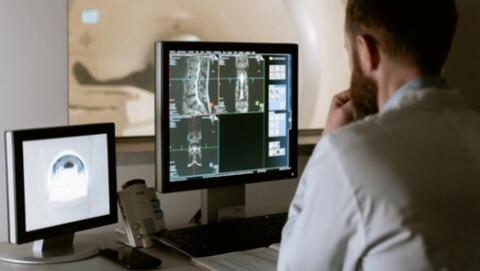
Master 2 in Integrative Biology and Physiology - International Master In Neurodegenerative Diseases
There has never been a more critical time to push the boundaries of our knowledge about the brain and brain diseases. The situation is particularly critical for neurodegenerative pathologies that affect so many members of our elderly.
The International Master in Neurodegenerative Diseases (iMIND) is a multidisciplinary program built on a partnership between Sorbonne Université (Paris) and the Paris Brain Institute with the collaboration of Heidelberg University, Vienna University, KU Leuven and Munich Technical University .
The iMIND master 2 combines coursework concerning neurodegenerative diseases (M2 year, 3rd semester) and a master’s thesis related to a research internship preferentially done in a laboratory affliated to one of the partner universities (M2 year, 4th semester).
It aims to train students who wish to understand the brain function brain in normal and pathological conditions, by providing access to the latest knowledge on neurodegenerative diseases, in close proximity with the research community (scientific teams, senior and junior researchers, technical platforms, living labs…).
Courses Taught in English - Master BIP - iMIND
2nd year Master - 1st Semester - 6 ECTS - English Level: B2 (no test required)
Brief Description
Students will be exposed to notions of fundamental, translational and clinical research by attending conferences at the Paris Brain Institute, where they will participate to discussions with the international scientists presenting.
Prerequisites
A Master 1 level in Biology/Neurosciences or equivalent is required.
Contact
Hélène Cheval (helene.cheval @sorbonne-universite.fr)
2nd year Master - 1st Semester - 6 ECTS - English Level: B2 (no test required)
Brief Description
Overview of the latest methodological approaches used to study in an integrative way the molecular andcellular mechanisms associated with neuronal function and dysfunction.
Focus on four main domains: Omics, stem cell research, imaging and electrophysiology.
Applications to advance research on diverse brain disorders including: Parkinson's desease, ALS; Alziemer's desease.
Prerequisites
Theoretical bases underlying the main techniques addressed in this course.
Contact
Hélène Cheval (helene.cheval @sorbonne-universite.fr)
2nd year Master - 1st Semester - 6 ECTS - English Level: B2 (no test required)
Brief Description
Overview of major neurodegenerative diseases and their clinical manifestations.
Provide an understanding of the mechanismms of neurodegenerative diseaes such as Alzheimer's, Parkinson's and Huntington's as zell as insight into neuronal cell death; genetics and existing treatments.
Contact
Hélène Cheval (helene.cheval @sorbonne-universite.fr)
2nd year Master - 6 ECTS - English Level: B2 (no test required)
Brief Description
Acquire the tools to describe and present a research project.
Students will introduce the scientific question that they will study during their Master’s thesis.
With the help of their host laboratory, students will develop their experimental approach with detailed protocols and feasibility considerations.
Prerequisites
Writting a letter of intention (scientific background; question raised, experimental strategy).
Oral presentation and sicussion with a researcher.
Contact
Hélène Cheval (helene.cheval @sorbonne-universite.fr)
2nd year Master - 1st Semester - 3 ECTS - English Level: B2 (no test required)
Brief Description
Overview of the latest methods from cognitive, behavioral and engineering sciences to refine our understanding of the behavioral and cognitive aspects of NDD.
Approach centered on humans: focus on methodologies to quantitatively assess the behaving patientes.
Contact
Hélène Cheval (helene.cheval @sorbonne-universite.fr)
Caroline Dubacq (caroline.dubacq@sorbonne-universite.fr)
2nd year Master - 1st Semester - 3 ECTS - English Level: B2 (no test required)
Brief Description
Overview of the physiological functions of the hippocampus and their alterations in a variety of neurological and psychiatric disorders, including epilepsy, schizophrenia and Alzheimer’s disease.
Description of the hippocampal functions at all levels, from cells and their synapses to human brain and its pathology.
Prerequisites
- Basic knowledge in electrophysiology
- Basic concepts in Neuroscience and cellular Biology.
Contact
Hélène Cheval (helene.cheval @sorbonne-universite.fr)
Jean-Christophe Poncer (jean-christophe.poncer@sorbonne-universite.fr)
2nd year Master - 1st Semester - 3 ECTS - English Level: B2 (no test required)
Brief Description
Discovery of the fascinating world of neuron-glia interactions and their roles in the brain physiology and pathophysiology.
Contact
Hélène Cheval (helene.cheval @sorbonne-universite.fr)
Caroline Dubacq (caroline.dubacq@sorbonne-universite.fr)
2nd year Master - 1st Semester - 3 ECTS - English Level: B2 (no test required)
Brief Description
Introduction to the study of etiopathogenic factors of neuropsychiatric disorders. Overview of a variety of techniques and their developments; including epidemiological and molecular genetics, gene expression regulation, brain imaging, neuropsychology evaluation; animal models; and tools for gene x gene and gene x environment interactions.
Prerequisites
Any Master 1 degree (mainly Biology, Medical Sciences). Since the TU is orientated towards genetics and molecular tools, it can be not particularly appropriated for students who have a background in psychology, neuropsychology or social sciences.
Contact
Hélène Cheval (helene.cheval @sorbonne-universite.fr)
Caroline Dubacq (caroline.dubacq@sorbonne-universite.fr)
